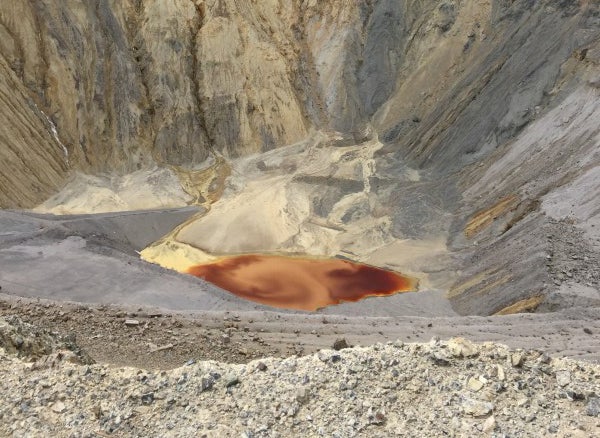We’re Suing to Make Industry Clean Up Its Own Messes
It’s time the dirtiest polluters in the country pay for their own toxic messes, instead of skipping town and leaving taxpayers with the bill.

This page was published 7 years ago. Find the latest on Earthjustice’s work.
Time and again, we’ve seen big industrial polluters emit toxic pollution that poisons the people and ecosystems nearby. And time and again, we’ve seen these polluters walk away from the bill, leaving taxpayers to fund the cleanup and communities to live with the contamination.
We don’t think that’s right, which is why Earthjustice is suing Scott Pruitt’s Environmental Protection Agency (EPA) for refusing to hold the mining industry accountable for their toxic waste cleanups.
Abandoned copper, gold and other hard-rock mines throughout the western U.S. have sat polluted for decades after valuable minerals were extracted, leaching acid mine drainage and even producing cyanide plumes that affect nearby residential drinking water supplies. When mine operators lack the funds to address these hazards, the cost burden is shifted onto taxpayers—often to the tune of hundreds of millions or even billions of dollars for a single site.
In a groundbreaking Earthjustice victory following nearly eight years of litigation, in January 2016 the D.C. Circuit Court of Appeals ordered the EPA to get moving on rules that will break this cycle. Though the agency eventually came up with a new rule, Pruitt abandoned it last December, effectively giving a huge handout to the mining industry.
The EPA must make these rules under the authority of the so-called “Superfund” law, passed by Congress in 1980 in response to the growing threat of leaking and abandoned toxic waste sites like Love Canal in New York. The law sought to allocate funding to clean up the many horribly contaminated sites already in existence. But it also sought to reduce the risk of creating new sites in the future.
To that end, the law directed the EPA to create rules requiring “financial assurances” from the nation’s dirtiest industries. Financial assurances include bonds, insurance or other financial mechanisms that ensure that the companies most likely to make toxic messes will be able to pay to clean them up if something goes wrong. This keeps the financial burden of cleanups off the backs of taxpayers. More importantly, financial assurances have been shown to significantly reduce pollution because they provide huge incentives to manage hazardous waste safely in the first place.
Under the Superfund law, the EPA was required to take the first step in this important rulemaking process in 1983. Instead, it did absolutely nothing for decades. In the meantime, the law’s dedicated tax on oil and chemical companies expired, and the Superfund fund went bankrupt. Though Congress appropriated some money for cleanup of Superfund sites from general tax revenues, the level of funding was drastically cut, meaning cleanups were delayed even further.
An initial Earthjustice victory in 2008 forced the EPA to issue findings on the industries most likely to create these toxic sites. The EPA found that hard rock mines, coal plants, oil refineries and chemical manufacturing facilities were the most likely to create the biggest messes. The EPA even found that, in some cases, these companies intentionally set up parent and subsidiary corporations so that the profits from industrial facilities could be funneled to the parent company, but when time came to clean up the mess, the subsidiary could declare bankruptcy and walk away, leaving the public with the bill.
Even after these findings, the EPA continued to delay. So Earthjustice went back to court. After years of litigation, the U.S. Court of Appeals for the D.C. Circuit finally broke the logjam in 2016 by agreeing to enforce a schedule for the EPA to finish the long-delayed rules. Now, our most recent lawsuit is intended to make these rules a reality so that the people and places near industries using hazardous chemicals can finally get a reprieve from irresponsible, dirty industries.
A version of this story was published on April 7, 2016.
Established in 1987, Earthjustice's Northwest Regional Office has been at the forefront of many of the most significant legal decisions safeguarding the Pacific Northwest’s imperiled species, ancient forests, and waterways.